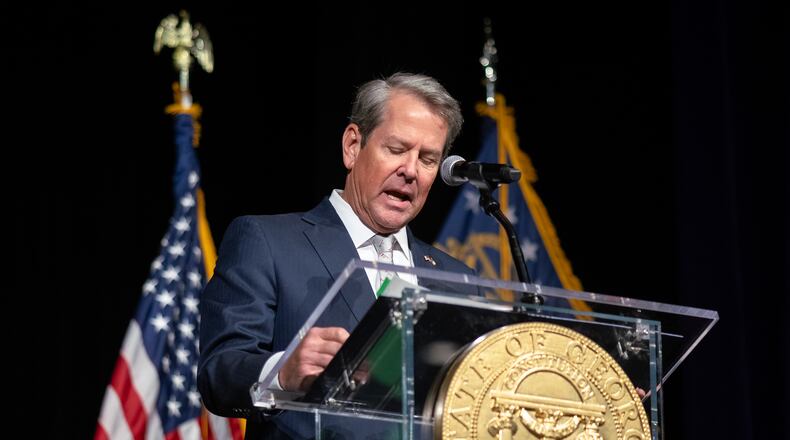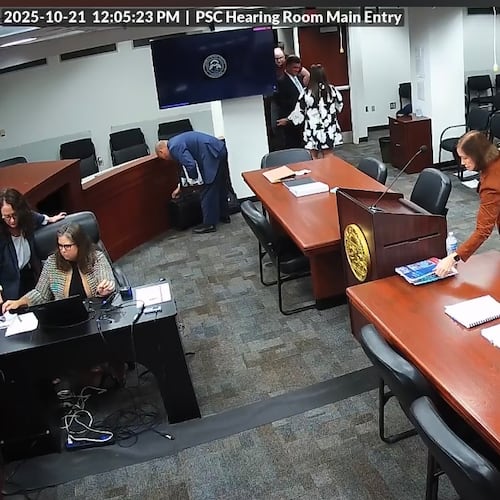Some of Georgia’s largest employers support Gov. Brian Kemp’s planned overhaul of state litigation rules, saying they have to defend baseless lawsuits arising from incidents outside their control.
“It is no secret that Georgia premises liability law is among the very worst in the nation,” Waffle House CEO Joe Rogers III said Tuesday during a lawsuit reform roundtable hosted by Kemp at the company’s headquarters in Norcross. “We’ve reached a tipping point where a major rebalancing is needed.”
Representatives from a dozen companies, including Walmart, RaceTrac, The Home Depot, Uber and Ford attended the roundtable, the last of three aimed at guiding lawmakers ahead of the 2025 legislative session.
“We’re starting to get some good ideas on things that need to be done,” said Kemp, adding that some businesses can’t get insurance in Georgia, no matter the cost.
Many of the business leaders said Georgia consumers shoulder costs associated with legal liability.
Newton Jennings, an executive at insurance brokerage firm Marsh McLennan Agency, said a study by The Perryman Group revealed every Georgia citizen pays about $1,200 annually in a “tort tax.” In January, the National Federation of Independent Business revealed the data in conjunction with Citizens Against Lawsuit Abuse, which ordered the study.
“Georgia’s legal climate has steadily worsened over the years,” Hunter Loggins, the NFIB’s Georgia director, said at the time. “We need our legislators to support efforts to create a legal landscape that treats everyone fairly.”
Jen Shepherd, the head of Uber’s global transit partnership division, said 22% of an Uber fare in Georgia goes toward insurance, compared to 7% in North Carolina, 9% in Tennessee, 11% in South Carolina and 12% in Texas.
“This is directly increasing prices for riders and it’s taking money out of the drivers’ pay,” she said.
The Georgia Trial Lawyers Association opposes lawsuit reform and says it will work “to ensure that courthouse doors remain open to everyday Georgians who are harmed by the wrongful conduct of negligent persons and corporations.” In response to Kemp’s planned litigation overhaul, the group said attacks on Georgia’s judicial system are unfounded and should not be tolerated.
“Georgia has been named the best state in the country in which to do business for ten straight years and with a court system that is the envy of the world,” the GTLA said in a news release. “A fair and healthy civil justice system has been and will continue to be good for business in Georgia.”
Georgia insurance commissioner John King said businesses can’t get insurance in parts of the state where crime increases liability risk. This leads businesses to exit some areas, forcing people to travel for basic needs.
“I’ve talked to my fellow insurance commissioners in the region, and Georgia is an outlier,” he said.
Rogers said Waffle House has done “everything short of installing a turret on the roof or a checkpoint at the entrance,” to protect staff and patrons and shield itself from negligent security claims. He said safety measures include installing more than 500 “walk-up windows” at restaurants, which reduces revenue at those locations by about 25%. He said Georgia beats the rate of installations in other states.
“All of y’all that wanted to go eat at the Waffle House after the Friday night football game, there’s 40 restaurants in metro Atlanta where you can’t do that anymore,” he said. “That privilege has been completely revoked because of us needing to mitigate risk.”
Joe Akers, the chief legal officer for RaceTrac, spoke about the closure of its former Piedmont Avenue location after a fatal shooting nearby. He said RaceTrac’s insurers want to settle lawsuits over that shooting and others, though the company maintains the shootings were not its fault.
“Due to the nature of Georgia law and some pretty bad (Georgia) Supreme Court decisions, there is just a significant amount of exposure,” Akers said.
He said RaceTrac’s security measures, including hiring off-duty police officers, closing stores overnight, locking doors and installing state-of-the-art cameras, don’t preclude negligent security claims in Georgia.
Will Barnette, an in-house Home Depot lawyer, said Georgia has a reputation for “huge nuclear verdicts” and a “deteriorating legal climate.” He said Home Depot is fighting a lawsuit after a customer in the parking lot of its Buckhead store was struck by a bullet fired from a neighboring property.
“The fact that a plaintiff’s lawyer would feel comfortable filing that kind of litigation says something about the legal climate here, and it’s not positive,” he said.
Doug Lampe, an in-house Ford lawyer, pushed for limits on jury awards as the company appeals a $1.7 billion verdict in a Gwinnett County case. He asked state lawmakers to extend an existing cap on punitive damages to product liability cases.
Kemp said he’s been talking with plaintiff attorneys to understand all sides of the issue.
In September, he hosted doctors and health care professionals at a roundtable in Macon focused on medical malpractice cases and their impact on patient services. His first lawsuit reform discussion in August involved small business owners and leaders in the transportation, child care, hospitality and food industries.
“If we don’t address this issue, it’s going to mean higher prices for our consumers and fewer job opportunities for hardworking Georgians,” Kemp said Tuesday.
About the Author
Keep Reading
The Latest
Featured




